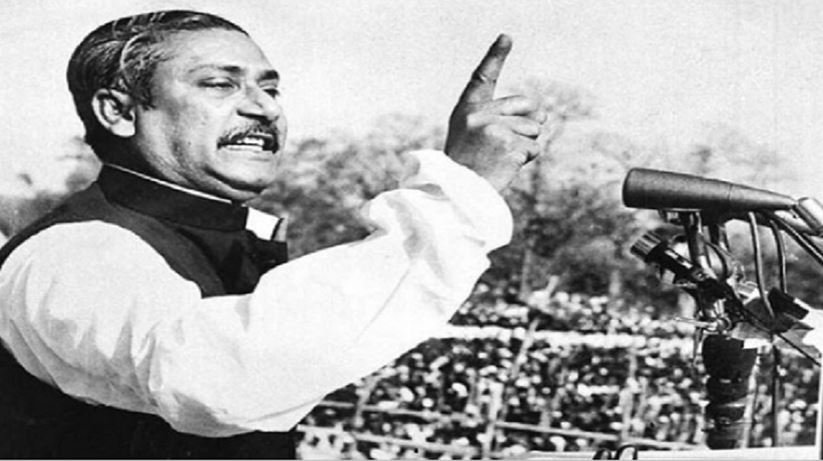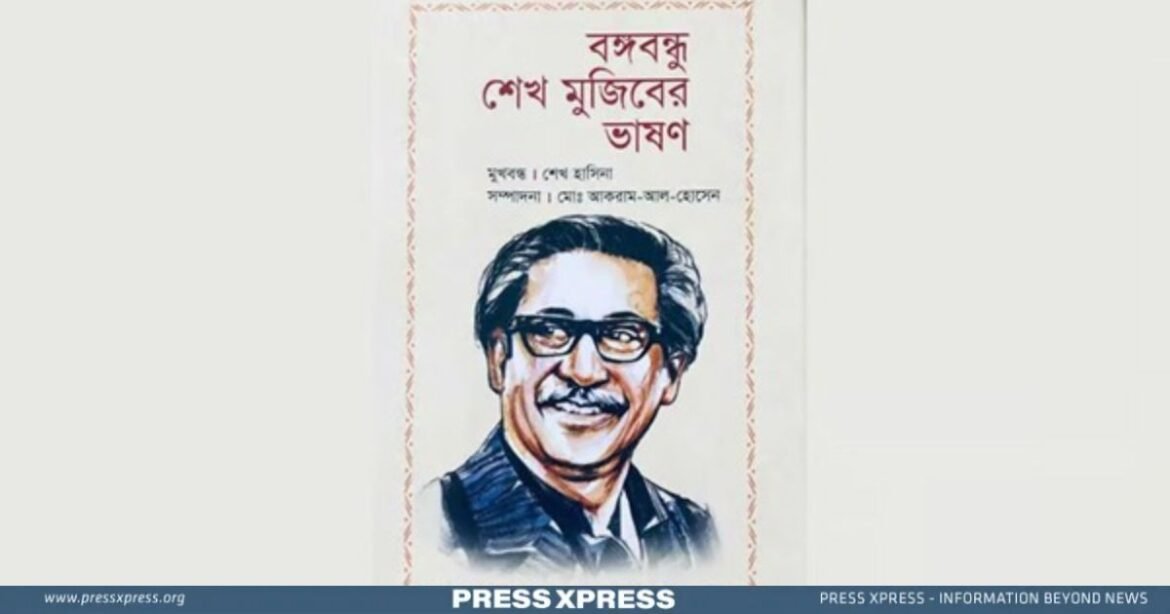Key Highlights:
- Administration, economy, foreign policy, defense, women’s development, education, and more
- Compilation of 58 speeches by Bangabandhu Sheikh Mujibur Rahman
- Laid out conditions for Pakistanis, issued instructions for Bengalis, and ignited the spirit of independence with “Joy Bangla”
- UNESCO’s Memory of the World International Register catalogs global significance
Prime Minister Sheikh Hasina on Monday (20th November 2023) unveiled a book titled ‘Bangabandhu Sheikh Mujib-er Bhashan’, a compilation of 58 speeches of Father of the Nation Bangabandhu Sheikh Mujibur Rahman. The book illuminates the foundational framework for shaping a new Bangladesh. This book was composed by the chairman of Palli Sanchay Bank and former senior secretary Md Akram-Al-Hossain and published by Mowla Brothers, at Gono Bhaban.
The Premier Unwrapped The Book At Ganobhaban
During the book launching ceremony, composer Md Akram-Al-Hossain and Mowla Brothers owner Ahmed Mahmudul Haque were present. The premier herself contributed by crafting the book’s introduction, enriching it further by incorporating QR codes for accessing the full audio versions of every speech. Mowla Brothers published the book.
You can also read: Joliot-Curie Peace Medal: A Testament to Bangabandhu’s Ideals
The publisher emphasized the profound historical significance of Bangabandhu Sheikh Mujibur Rahman’s speeches, characterizing them as invaluable components of history. These speeches, he noted, mirror the challenging life of the leader while illuminating the resplendence of the Bengali nation’s sacrifices and its unwavering yearning for freedom.

“Bangabandhu’s speech is a positive document of economic, political and cultural freedom of Bengalis,”
Mahmudul Haque
Key words
- Book Launch
- Date: November 20, 2023
- Title: ‘Bangabandhu Sheikh Mujib-er Bhashan’
- Publisher: Mowla Brothers
The Book On ‘bangabandhu Sheikh Mujib-er Bhashon’
The book reflected the way Bangabandhu wanted to build Bangladesh, which would be research and guiding documents for the researchers, thinkers, economists, policy makers and political leaders who want to realize Bangabandhu’s dream of building a Golden Bengal.
The book will be available at Pathak Shamabesh, Kataban, Dhaka.
Mahmudul Haque eloquently described Bangabandhu’s speeches as illuminating documents, reflecting the economic, political, and cultural emancipation of the Bengali people. Notably, Bangabandhu’s historic address on March 7, 1971, played a pivotal role in the birth of an independent Bangladesh after a nine-month-long liberation war. The international recognition bestowed upon Bangabandhu as the ‘Poet of Politics,’ and UNESCO’s acknowledgment of his speech in the Memory of the World International Register (MOW) further solidifies its global significance.
Tactical Declaration Of Independence And Instructions To Conduct War
On 7th March 1971 , a nationwide non-cooperation movement sparked by Bangabandhu’s call clashed with attempts by the Pakistani junta to eliminate him. Despite this tense backdrop, Bangabandhu delivered his speech on March 7. Student leaders urged him to declare independence directly, but the junta warned of dire consequences, threatening a peaceful rally’s descent into chaos. Pakistani aircraft hovered over Suhrawardy Udyan, and stocked tanks loomed near the cantonment.
Despite these threats, Bangabandhu addressed the people for 22 to 23 minutes, calling for readiness for freedom and the Liberation War without explicitly declaring independence to prevent branding the struggle as separatist. He laid out four conditions for Pakistanis and issued 10 instructions for his countrymen.
Significance Of The March 7 Speech
Bangabandhu Sheikh Mujibur Rahman’s historic speech on March 7, 1971 is extensively recognized as one of the utmost iconic speeches in history.
Bangabandhu Sheikh Mujibur Rahman’s 7th March Speech, a revolutionary poem, ignited the spirit of freedom among Bangladeshis, birthing a new nation. While standing in front of a sea of people Bangabandhu, the poet of politics roared “Joy Bangla” with the responsibility of the whole nation on his shoulder, it had an instantly electrifying effect on them towards attaining a common purpose, freedom.
In his historic address, Bangabandhu Sheikh Mujibur Rahman articulated four prerequisites for the Awami League’s engagement in the March 25 National Assembly gathering:
- the abolition of martial law,
- the withdrawal of military personnel to barracks,
- the transfer of authority to duly elected representatives,
- a comprehensive investigation into fatalities arising from the conflict.
Furthermore, he issued a series of directives for a civil disobedience movement, urging citizens not to pay taxes, mandating that government officials follow his directives exclusively, advocating strikes in East Pakistan’s secretariat, government, semi-government offices, and courts. He specified that only local and inter-district telephone lines should operate, allowing railways and ports to function but encouraging workers not to collaborate in suppressing the people of East Pakistan.
At the end of his speech, Bangabandhu Sheikh Mujibur Rahman declared, “Ebarer Sangram Amader Muktir Sangram, Ebarer Sangram Swadhinatar Sangram” (The struggle this time is the struggle for our emancipation; the struggle this time is the struggle for independence).
This seminal speech resonated with the fervent aspirations of the Bangladeshi populace, vividly portraying the atrocities inflicted by the Pakistani occupation forces on the Bengalis.
At this critical juncture in the struggle for independence, Bangabandhu rallied the Bengali populace, urging them to stand prepared with whatever resources they possessed. This address marked the culmination of efforts to unify the nation against the oppressive forces and galvanize preparations for participation in the impending armed War of Liberation, inspired by his stirring oratory.
Bangabandhu will also always be recalled for his enormous contribution towards the world recognizing Bangladesh as a country that had arisen from the ashes to develop a significant player among the international community of nations.
Bangabandhu was gifted with extraordinary organizational insight and had the feeling of the brutality of the Pakistani military junta. His historic 7th March speech stands articulate testimony to that.
Unesco Recognizes Bangabandhu’s 7th March Speech In World’s Heritage
The renowned 7th March, 1971 speech by Bangabandhu Sheikh Mujibur Rahman, the Father of the Nation, has earned its place in UNESCO’s Memory of the World International Register. Irina Bokova, UNESCO’s Director General, made the announcement on October 30, 2017, at the organization’s headquarters in Paris.
This prestigious registry catalogues documents of global importance, aiming to safeguard and provide access to crucial documentary heritage worldwide. To make it onto the International Register, a document must demonstrate immense significance, becoming a vital part of the world’s documentary heritage, as validated by UNESCO’s stringent criteria.


